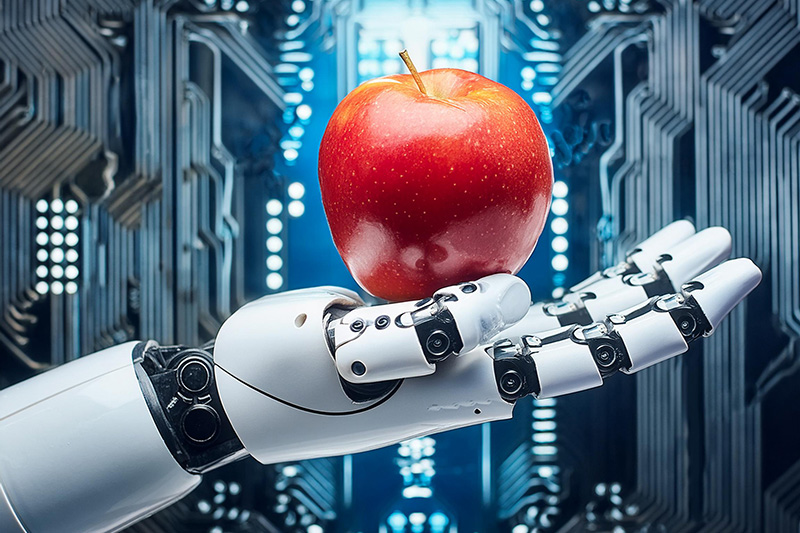Just as iOS 18 has revolutionized the iPhone, making it more personal, capable, and intelligent than ever, modern ERP systems are bringing about similar transformations in the business world. These advanced systems, powered by artificial intelligence (AI), tailor business processes to be more adaptive, insightful, and effective, aligning closely with the overarching goals and real-time operational needs of companies.
Understanding ERP Systems in Modern Businesses
Enterprise Resource Planning (ERP) is integral to contemporary business strategy, employed by companies across various industries to streamline processes, integrate various functions, and enhance overall efficiency. As business software, ERP plays a critical role in consolidating data from different departments such as finance, HR, manufacturing, and supply chain, into a single cohesive system. This consolidation allows for better data accuracy, improved process efficiency, and significant cost reductions.
AI Enhancements in ERP Systems
Today’s ERP systems are not just about integration; they’re increasingly about intelligent automation and personalization. AI enhances ERP systems in numerous ways, from automating routine tasks to providing predictive analytics for better decision-making. For instance, AI algorithms can analyze historical data and predict future trends, helping businesses to manage inventory more effectively or optimize their staffing levels based on anticipated demand.
The Multifaceted Benefits of ERP Systems
- Increased Efficiency: By automating routine tasks, ERP systems allow employees to focus on more strategic activities. This shift not only increases productivity but also speeds up business operations and reduces human error.
- Enhanced Decision-Making: With all critical business information integrated into a single platform, decision-makers have immediate access to real-time data across the enterprise. This accessibility enables quicker and more informed decisions, which is crucial in a rapidly changing market environment.
- Cost Reductions: ERP systems streamline processes and provide greater visibility into the operations of a business. This transparency helps in identifying cost-saving opportunities in areas like production, procurement, and supply chain management.
- Improved Customer Service: Integration of information across departments means that customer service teams have better access to the data they need to serve customers effectively. Whether it’s handling inquiries, processing orders, or resolving issues, an ERP system enhances the overall customer experience.
- Scalability: Modern ERP systems are designed to grow with your business. They can be customized and scaled to accommodate new business processes, additional users, or expansion into new markets, making them ideal for businesses aiming for growth.
Implementing ERP in Your Business
Choosing and implementing the right ERP system is a significant decision. Businesses must consider factors such as their size, existing software infrastructure, and specific process needs. Implementation involves careful planning, a clear understanding of desired outcomes, and often, a partnership with experienced vendors who can tailor the business software to meet specific organizational requirements.
Moreover, training and support are critical to ensure that all users can leverage the ERP system effectively. An adequately implemented ERP solution can foster an environment of continuous improvement and innovation within the organization.
The Continuing Evolution of ERP
As technology advances, so too does the functionality of ERP systems. The future of business software lies in its ability to integrate with emerging technologies such as IoT (Internet of Things), more advanced AI and machine learning algorithms, and blockchain. These integrations promise to further elevate the capabilities of ERP systems, making business operations more connected, secure, and responsive to the market dynamics.
What is Multiable M18 ERP?
As businesses seek more robust and adaptive ERP solutions, products like Multiable M18 ERP stand out for their innovative features and comprehensive capabilities. Multiable M18 ERP is designed to cater to the diverse needs of modern businesses, integrating core business functions with advanced features like real-time analytics, cloud mobility, and extensive customization options. This software not only supports the operational nuances of different industries but also adapts to the unique workflows and processes of each business, enhancing both performance and profitability. With Multiable M18 ERP, companies of all sizes can expect a reliable, insightful, and efficient tool that scales seamlessly with their growth ambitions.
In conclusion, just as iOS 18 has made the iPhone a more personalized and smarter device, AI-powered ERP systems like Multiable M18 ERP are transforming businesses into more intelligent, efficient, and capable entities, ready to meet the challenges of the digital age head-on.
With a solid foundation of over three decades in the industry, Multiable stands at the forefront of Asia’s IT sector, providing advanced cloud-native business solutions through a robust team of more than 300 specialists. Serving over 6000 enterprises, Multiable enhances digital collaboration across various domains with its comprehensive product portfolio, including ERP, HCM, CRM, POS, along with RPA/AI technologies. Our e-commerce strategies empower clients to unlock new market opportunities and foster business expansion efficiently. Multiable distinguishes itself by emphasizing a NO CODE approach, ensuring businesses remain flexible and scalable amidst rapid technological advancements. Choose Multiable for a partnership that promises not only to achieve targets but to elevate your business vision to unprecedented levels.
Contact us


